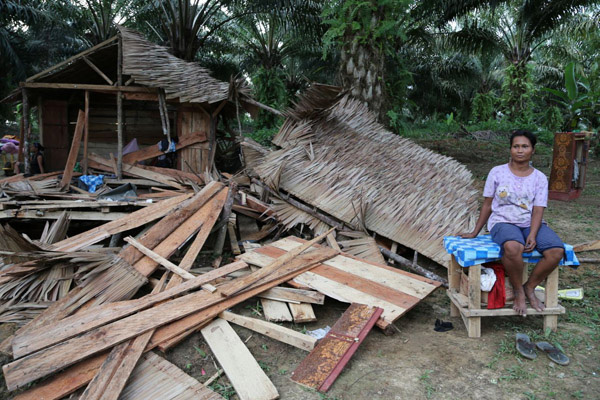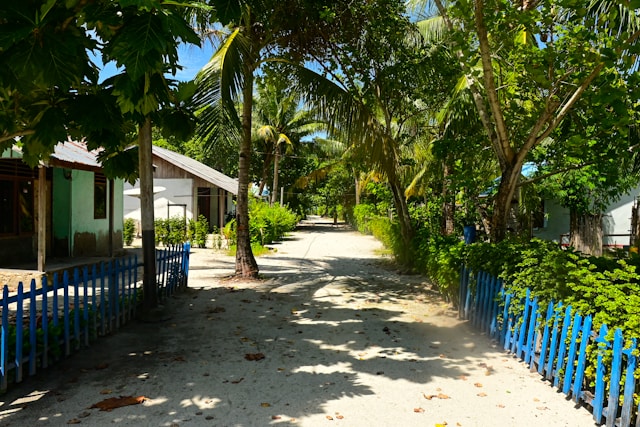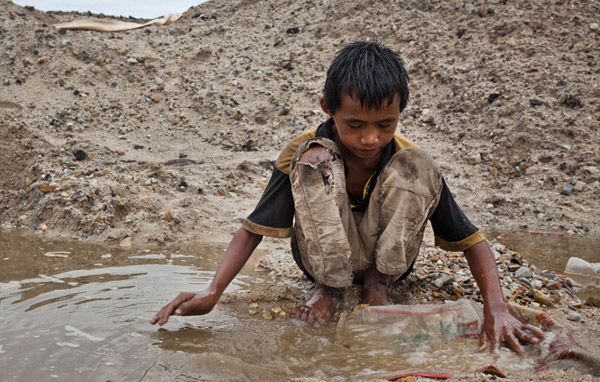
by DGR Colorado Plateau | Oct 7, 2015 | Indigenous Autonomy, The Solution: Resistance
By Intercontinental Cry
Territories of Life is a video toolkit with a purpose. It’s aim: to bring stories of resistance, resilience and hope to indigenous communities on the frontline of the global rush for land.
Produced by our friends at LifeMosaic, a non-profit based in Scotland, the Territories of Life toolkit consists of ten stories that were filmed in communities across Indonesia, Philippines, Guatemala, Ecuador, Colombia, Paraguay, Tanzania and Cameroon.

“The videos in the Territories of Life toolkit share inspirational stories of communities that are successfully organizing to defend their territories and their futures,” reads a press release from LifeMosaic. They include “The story of Maasai indigenous women in Tanzania who used awareness raising, protests and political pressure to lead a movement in defense of their territory; and the Misak indigenous people in Colombia who have developed and are carrying out their Plan de Vida, a long‐term vision for self-determined development.”
The toolkit also includes a few primers on land rights, land grabs, and common tactics that companies use to convince communities to accept and support their projects.
LifeMosaic goes on to say that, “The video toolkit and accompanying facilitators’ guide are intended to support indigenous peoples as they exercise their right to free, prior and informed consent; advocate for their rights; participate more actively in local spatial planning; and draw up village action plans for self‐determined development and for protecting their territories, forests and resources.”
It’s more than mere lip service. LifeMosaic is actively working with hundreds of local partners to facilitate the free distribution of Territories of Life to indigenous communities and supporting organizations around the world.
To order a copy of the toolkit, visit www.lifemosaic.net. If other groups request a DVD, LifeMosaic recommends a donation of $11 (£10). The videos can also be downloaded online at their website.

by Deep Green Resistance News Service | Dec 16, 2013 | Colonialism & Conquest, Indigenous Autonomy
By Diana Parker / Mongabay
Nearly 150 homes were reportedly destroyed in the latest incident in a long-standing conflict between indigenous Batin Sembilan residents and former Wilmar unit PT Asiatic Persada.
Indonesian security forces allegedly stormed several villages inside a Sumatran palm oil plantation concession last weekend and earlier this week, accompanying company staff and hired thugs accused of destroying dozens of homes and looting residents’ property.
Witnesses said the raids began when members of the Indonesian military (TNI) and the police mobile brigade (Brimob) descended on Padang Salak hamlet in Bungku village at 4 p.m. on Dec. 7 together with PT Asiatic Persada personnel and local thugs paid by the company.
“That day [Dec. 7], they destroyed the homes of [Padang Salak residents] Budi and Peheng,” Norman, a resident of nearby Pinang Tinggi hamlet, told Mongabay-Indonesia by phone on Monday. “The next day, they returned and destroyed around 50 homes of residents.”
Norman estimated that as many as 1,500 staff, thugs and security forces were involved in the raids on Saturday and Sunday, a figure also reported in multiple Indonesian news outlets covering the attack.
According to a report on Monday by the Indonesian news portal beritasatu.com, some residents tried to stand their ground but were overwhelmed by the size of the mob. At one point on Sunday, according to the report, the clash came to blows and security forces fired shots into the air.
Norman also told Mongabay-Indonesia that police and military had fired shots during the conflict and that company security officers and thugs armed with knives and machetes had tried to attack residents.
Around 70 residents who had tried to fight back to prevent the demolition eventually fled.
One community member was seriously injured when his hand was cut, Norman said, adding that several motorbikes owned by residents were also destroyed and a box containing cash and jewelry was stolen.
On Sunday, some members of the community living inside the concession reportedly responded by burning a guard post and company warehouse in Padang Salak. Two residents were arrested after the incident, and, as of Dec. 14, remain in detention. Norman added that police were also attempting to arrest community leaders.
Troubled history
These evictions are the latest incident in a more than 25-year conflict between PT Asiatic Persada, which until earlier this year was owned by palm oil giant Wilmar, and the indigenous Batin Sembilan community living inside the company’s concession in Jambi province on the island of Sumatra.
Wilmar had earlier been accused of destroying the homes of 83 families living inside the concession in 2011 following another violent clash – also involving Brimob forces – over allegations that members of the community were stealing palm fruits from the company.
After the 2011 incident, human rights groups helped the community file complaints with the Roundtable on Sustainable Palm Oil (RSPO) and the World Bank Group’s private sector lender the International Finance Corporation (IFC) – both of which have standards in place designed to prevent member companies or borrowers from violating the rights of local communities.
Wilmar is a member of the RSPO and received financing from the IFC, and in response to the complaints the IFC’s Compliance Advisor Ombudsman eventually stepped in to mediate talks between the company and members of the affected community.
However, earlier this year, Wilmar sold PT Asiatic Persada to two non-RSPO companies that do not receive IFC financing – meaning they are not bound by the same commitments to resolve the dispute. One of the buyers, PT Agro Mandiri Semesta (AMS), is a unit of the Ganda Group, a business group owned by Ganda Sitorus, the brother of Wilmar founder Martua Sitorus.
The IFC formally withdrew from the case in October after the new owners decided not to continue the IFC-mediated talks. Now it appears that PT AMS is resorting to the same tactic used by Wilmar in 2011 and forcibly evicting residents.
Evictions continue
According to multiple reports from victims and members of Suku Anak Dalam 113 – a group composed of members of the indigenous Batin Sembilan community who claim to hold the rights to over 3,500 hectares of land inside the concession – the evictions continued throughout the week and into the next weekend as company personnel and hired thugs, escorted by government security forces, destroyed homes and drove residents from at least two more hamlets in the concession.
Basron, a 41-year-old resident of Pinang Tinggi, was in his home on Wednesday morning at 10 a.m. when he felt his house shake. He went outside to see his home surrounded by plainclothes thugs and PT Asiatic Persada employees wearing green shirts, escorted by several TNI and Brimob members.
“We are from the integrated team,” a member of the mob said, according to Basron. “Quickly clean up your things. All the homes will be evicted today.”
Basron told Mongabay-Indonesia that the thugs and company personnel were armed with sharp weapons such as knives, axes and machetes, while military and police carried firearms. They had driven to the hamlet in dozens of Mitsubishi pickup trucks, also bringing heavy equipment including an excavator, which they used to destroy the homes.
In total, Basron estimated around 700 people came as part of the “integrated team,” splitting into several groups to carry out the evictions. Each group was composed of dozens of thugs and PT Asiatic Persada employees and escorted by police and military personnel.
After removing his possessions, Basron watched as a member of the team used the excavator to destroy his home. Once the house was destroyed, he said they instructed him to quickly clean up the debris.
“If it’s not clean, we will come again tomorrow. We will burn it all,” they said, according to Basron.
Basron said they also looted his livestock, taking away a chicken and several other birds worth Rp 600,000 ($50). Other Pinang Tinggi residents also reported members of the eviction team stealing livestock, cash and other valuables.
“My cash box was filled with Rp 6 million and they dismantled it and took what was inside,” Daim, another Pinang Tinggi resident, told Mongabay-Indonesia, while showing the broken box.
“Diesel fuel and oil, they spilled,” Daim added. “If they had been able to lift it, they would have even taken my generator.
Victims also reported having their cell phones destroyed when they tried to photograph the evictions. “Don’t take pictures of our actions,” an integrated team member allegedly told Meldi, a 25-year-old Pinang Tinggi resident, shortly before destroying his phone.
Meldi was still able to snap several photos of the raid using another cell phone, but villagers said they have little documentation of the evictions while they were taking place since they were told not to take pictures or use their phones.
Basron said the integrated team destroyed 109 homes in Pinang Tinggi on Wednesday. Another 31 homes were reported destroyed during evictions in Padang Salak on Dec. 7 and 8, while six homes were reported leveled in Terawang hamlet.
In total, victims said the teams destroyed 146 houses over three days. Reports also indicate evictions were carried out on Thursday, Friday and Saturday in Tanah Menang hamlet, where another 600 homes are located, however Mongabay-Indonesia has yet to confirm how many houses were destroyed in those raids.
From Mongabay: “Indonesian palm oil company demolishes homes and evicts villagers in week-long raid“

by Deep Green Resistance News Service | May 26, 2013 | ACTION, Colonialism & Conquest, Indigenous Autonomy
By John Vidal / The Observer
Land conflicts between farmers and plantation owners, mining companies and developers have raged across Indonesia as local and multinational companies have been encouraged to seize and then deforest customary land – land owned by indigenous people and administered in accordance with their customs. More than 600 were recorded in 2011, with 22 deaths and hundreds of injuries. The true number is probably far greater, say watchdog groups.
The Indonesian national human rights commission reported more than 5,000 human rights violations last year, mostly linked to deforestation by corporations. “Deaths of farmers caused by the increase in agrarian conflicts all across Indonesia are increasing,” said Henry Sarigih, founder of the Indonesian Peasant Union, which has 700,000 members.
“The presence of palm oil plantations has spawned a new poverty and is triggering a crisis of landlessness and hunger. Human rights violations keep occurring around natural resources in the country and intimidation, forced evictions and torture are common,” said Sarigih. “There are thousands of cases that have not surfaced. Many remain hidden, especially by local authorities,” he says.
Communities complain that they are not warned, consulted or compensated when concessions are handed out and that they are left with no option but to give up their independence and work for minimal wages for the companies.
At fault are badly drafted laws, unclear regulations, corruption and heavy-handed security and paramilitary forces – all of which favour large business over the poor. Illegal land purchases and logging are mostly supported by police, armed forces and local government staff. Companies are even allowed to work with security forces.
Feelings run high when land is taken and livelihoods are wiped out by deforestation. In December 2011, 28 protesters from a logging concession area on Padang island in Sumatra sewed their mouths shut in front of the parliament building in Jakarta in a protest against having their land “grabbed” by a giant paper and pulp company.
Last year, three people were killed in a clash with security forces during a protest over gold prospectors in Bima on the island of Sumbawa. Farmers from Mesuji in Sumatra claimed that security forces murdered residents to evict them from their land.
Over 10m hectares (24.7m acres) of land has been given away and converted to plantations in the last 10 years, forcing thousands of communities to give up forest they have collectively used for generations. Politicians offer land to supporters and give permission to develop plantations with little thought for the human or ecological consequences. In addition, government attempts to move landless people from densely populated areas to less populous areas with “transmigration” policies have caused major conflicts with indigenous groups in provinces like Papua and Sulawesi.
“Who controls the land in Indonesia controls the politics. Corruption is massive around natural resources. We are seeing a new corporate colonialism. In the Suharto era you were sent to prison for talking about the government. Now you can be sent there for talking about corporations,” says Abetnego Tarigan, director of Friends of the Earth Indonesia in Jakarta.
Three of the group’s staff members, including its south Sumatra director, are in prison following protests at the involvement of the police and military in a land dispute involving a state-owned palm oil plantation firm. “The scale of the conflicts is growing. Every day new ones are reported. More and more police are now in the plantations. Government is trying to clamp down on mass protests,” said Tarigan.
“These developments are classed as ‘growth’ but what we are seeing is the collapse of communities of fisherfolk or farmers and increasing poverty. We are exchanging biodiversity for monocultures, local economies for global ones, small-scale producers are becoming labourers and community land is becoming corporate. This is the direction we are going.”
From The Guardian: http://www.guardian.co.uk/world/2013/may/25/indonesia-new-corporate-colonialism
Photo by SnapSaga on Unsplash

by Deep Green Resistance News Service | Apr 26, 2013 | Mining & Drilling, Worker Exploitation
By Mongabay
Mobile device giant Samsung has admitted to using tin sourced from a controversial mining operation on the Indonesian island of Bangka, where unregulated mining kills 150 miners a year and causes substantial environmental damage, reports The Guardian and Mongabay-Indonesia.
Samsung’s admission came after a campaign by Friends of the Earth, which led to nearly 16,000 customers contacting the company. In an email sent the customers and the NGO, Samsung said it is investigating the matter.
“While we do not have a direct relationship with tin suppliers from Bangka Island, we do know that some of the tin that we use for manufacturing our products does originate from this area,” Samsung said. “We are also undertaking a thorough investigation of our supply chain in the region to better understand what is happening, and what part we play.”
Bangka and neighboring island Belitung account for about 90 percent of Indonesia’s tin production. Mining on the islands involves more than half the population, but is largely unregulated, leading to a raft of ills. An investigation last year by the Guardian and Friends of the Earth found widespread use of child labor, clearing of forests, and degradation to coral reefs. Accidents kill scores of people each year.
After the investigation, Friends of the Earth called on Samsung and Apple to disclose whether they use tin from Bangka in their smartphones and tablets. To date only Samsung has admitted to sourcing Bangka tin, a point highlighted by Friends of the Earth.
“It’s great Samsung has taken an industry lead by tracking its supply chains all the way to Indonesia’s tin mines and committing to taking responsibility for helping tackle the devastating impact that mining tin for electronics has on people and the environment,” said Craig Bennett of Friends of the Earth in a statement.
“Rival Apple is already playing catch-up on the high street in terms of smartphone sales – it’s time it followed Samsung’s lead by coming clean about its whole supply chains too.”
From Mongabay: “Samsung admits to using tin linked to child labor, deforestation; Apple mum on sourcing“
by Deep Green Resistance News Service | Jun 29, 2012 | Agriculture, Biodiversity & Habitat Destruction, Lobbying
By Oliver Milman / The Guardian
The world’s densest population of orangutans is set to be “extinguished” by a massive new wave of fires that is clearing large tracts of a peat swamp forest in the Indonesian island of Sumatra, conservationists have warned.
Environmentalists claim that satellite images show a huge surge in forest blazes across the Tripa peat swamp in order to create palm oil plantations, including areas that have not been permitted for clearing.
Tripa is home to a tight-knit enclave of around 200 critically endangered orangutans. However, this number has plummeted from an estimated population of 3,000.
Just 7,000 orangutans remain in Sumatra, with rampant forest clearing for palm oil cultivation blamed for their decline.
Ian Singleton, head of the Sumatran Orangutan Conservation Programme (SOCP), said that the Tripa orangutans are being “extinguished.”
“The situation is indeed extremely dire,” he said. “Every time I have visited Tripa in the last 12 months I have found several orangutans hanging on for their very survival, right at the forest edge.”
“When you see the scale and speed of the current wave of destruction and the condition of the remaining forests, there can be no doubt whatsoever that many have already died in Tripa due to the fires themselves, or due to starvation as a result of the loss of their habitat and food resources.”
Felling trees from Tripa’s carbon-rich peat also triggers the release of large amounts of CO2 into the atmosphere. Indonesia has been named as the third highest emitter of CO2 emissions in the world when deforestation is a factor, although the country disputes this.
Environmentalists have lodged a lawsuit against PT Kallista Alam, one of the five palm oil firms operating in Tripa, and Irwandi Yusuf, the former governor of Aceh, over the approval of a permit for the 1,600-hectare (3,950-acre) palm oil plantation.
Irawardi, previously styled as a “green” governor, says he granted the permit due to delays in the UN’s Redd+ (Reducing Emissions from Deforestation and Forest Degradation) programme, which has seen Norway pledge $US1bn to Indonesia to reduce deforestation.
“The international community think our forest is a free toilet for their carbon,” Irawardi said in April. “Every day they are saying they want clean air and to protect forests … but they want to inhale our clean air without paying anything.”
SOCP and lawyers representing Tripa’s local communities have called upon the Indonesian president, Susilo Bambang Yudhoyono, to bypass an ongoing government investigation into the forest clearing and immediately halt the razing of the area.
“This whole thing makes absolutely no sense at all, not environmentally, nor even economically,” said Singleton.
From The Guardian: http://www.guardian.co.uk/environment/2012/jun/29/fires-indonesia-orangutan





